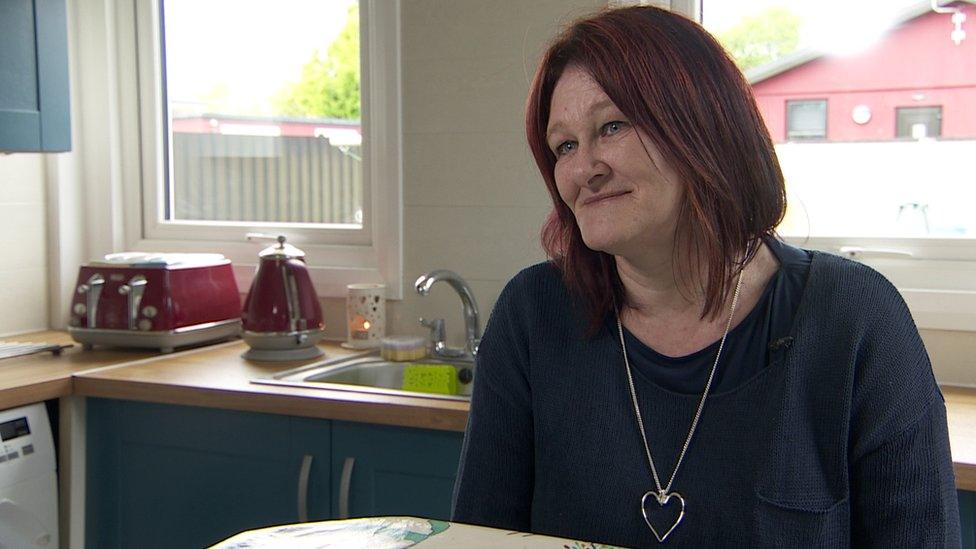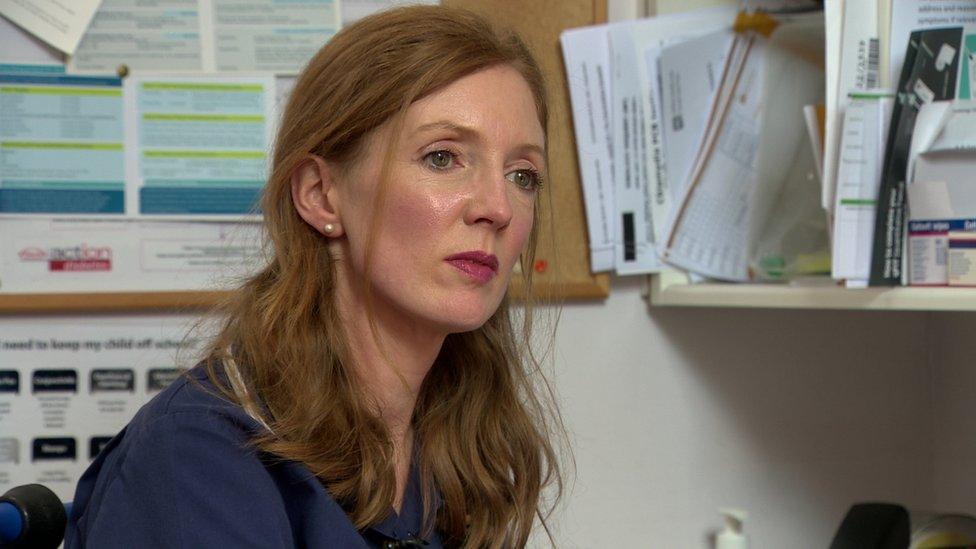Menopause: Post-hysterectomy care in NI must improve, says patient
- Published

Mechelle Davis was 48 when she had her operation
A woman who had a hysterectomy has said she was discharged without sufficient information on its impact on her physical and mental health.
Mechelle Davis, from County Down, said it was crucial women left hospital with appropriate medication and advice.
Her operation involved removal of her womb, ovaries, fallopian tubes, and cervix.
The South Eastern Health Trust said patients were told pre and post-surgery of the risks and benefits involved.
Ms Davis was 48 when she had her operation and said she had no option but to look online for advice, something she described as "unsatisfactory".
"I had the operation in October 2022 and didn't go on HRT until the following February," she told BBC News NI.
"I felt that I was going crazy, the night sweats, the hot flushes and then the low mood.
"Every woman who is going through the menopause - including surgically induced - needs support.
"We need to know what to expect because it is a total life-changer."
She added that she left hospital with a pessary, anti-blood clotting injections and a leaflet on pelvic floor exercises.
"Women just feel that you get your hysterectomy and bye bye there you go," Ms Davis said.
The South Eastern Health Trust said while it could not comment on individual cases, its patients were "provided with written information and are signposted to online resources, to assist with informed consent".
"These resources include patient information leaflets for consent, Royal College of Obstetrics and Gynaecology information on abdominal hysterectomy; recovering well, menopause and later life and websites such as Menopause Matters and the British Menopause Society website," the statement added.
In its online tool for clinicians, British Menopause Society advise that HRT plays a significant role in managing surgical menopause, especially in women under 45 - provided there are no contradictions such as personal history of hormone dependant cancer.
It also adds that "all women undergoing surgical menopause should have counselling and be provided with information about the hormonal consequences of surgery and the role of HRT, both before surgery and before leaving hospital with clear communication to the primary care team."
BBC News NI has spoken to other women who, after having a hysterectomy, were discharged without advice or a HRT prescription.
All the women said they felt miserable, confused and debilitated but that symptoms eased after taking HRT.
Menopause training
General practice nurse Elizabeth Wenden-Kerr said it would be a "win win for women and the health service" if professionals like her were given specialist menopause training to help women like Ms Davis.
Ms Wenden-Kerr is petitioning parliament to introduce menopause training for general practices.
From her east Belfast surgery, the nurse said it was important that women were "provided with evidence-based information" to help inform their decisions about taking Hormone Replacement Therapy, also, to warn them about what to expect post-surgery.

Elizabeth Wenden-Kerr is petitioning parliament to introduce menopause training for general practices
She secured funding from the Royal College of Nursing to train and receive a qualification in menopause education from the British Menopause Society.
She said she saw as many women as possible or offered advice by phone about hormonal or non-hormonal treatment.
"I think it would be a win-win for women and the health service because by offering women treatment - we then hopefully will improve the health of women and then fend off long term conditions associated with menopause such as heart disease, diabetes, osteoporosis - so yes if offers support for women both now and in the future.
"Often the GPs here will refer women to us to work out whether their symptoms are menopausal or if something else is going on. We then can discuss the best treatment options for them and provide a choice of treatment."
While GPs receive some menopause training, many have told BBC News NI it was not enough and they had to refer to the British Menopause Society's tool kit, which was not ideal.
No women's health strategy
In February, a consultant addressed the issue of hysterectomies on social media.
Dr Siobhan Kirk, associate specialist in gynaecology and menopause posted on Twitter for "gynaecology colleagues to "please stop removing young women's ovaries without adequate pre-op discussion on the consequences/symptoms of #menopause and a clear plan for ~HRT including those having risk reducing surgery."
Dr Kirk works at the Belfast Health Trust and is a specialist at the menopause clinic based at the Mater Hospital in the north of the city.
Allow X content?
This article contains content provided by X. We ask for your permission before anything is loaded, as they may be using cookies and other technologies. You may want to read X’s cookie policy, external and privacy policy, external before accepting. To view this content choose ‘accept and continue’.
Northern Ireland remains the only region in the UK to not have a women's health strategy.
Without an executive at Stormont, attempts to introduce one have stalled.
Recently the issue and the absence of a legislature was raised during Northern Ireland Questions in the House of Commons when Labour MP Carolyn Harris asked Northern Ireland Secretary Chris Heaton-Harris to meet her and Menopause Support Group NI to address their campaign for improved menopause services.
Mr Heaton-Harris said he would be be more than happy with to meet her.
- Published7 November 2024

- Published3 July 2021
